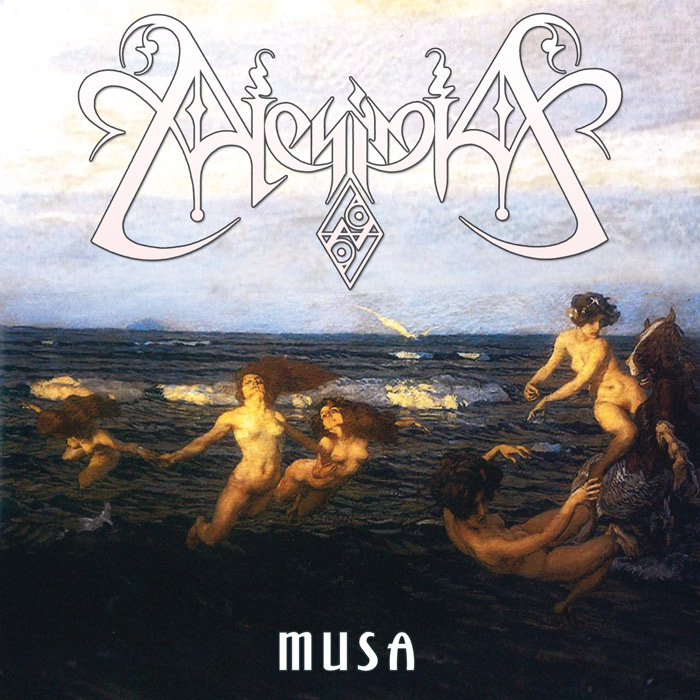 It seems Emmanuelle Tito, the man behind the Alchimia project, has a feel for classicism. The fusion of painted, classical artwork with overt utilization of Italian1 and Latin2 on Musa, his first release under this alias, depict a desire for a particular grandiosity which travels beyond the blue collar roots of metal. And the record’s music itself aids this view: it fuses old-school production tendencies with the gothic touches being introduced into metal during the early-mid 90s. It isn’t specifically derivative but evokes an era when forward-thinking metal bands were beginning to diversify their sounds, connecting hitherto disconnected influences.
It seems Emmanuelle Tito, the man behind the Alchimia project, has a feel for classicism. The fusion of painted, classical artwork with overt utilization of Italian1 and Latin2 on Musa, his first release under this alias, depict a desire for a particular grandiosity which travels beyond the blue collar roots of metal. And the record’s music itself aids this view: it fuses old-school production tendencies with the gothic touches being introduced into metal during the early-mid 90s. It isn’t specifically derivative but evokes an era when forward-thinking metal bands were beginning to diversify their sounds, connecting hitherto disconnected influences.
This substantially manifests itself in music which references the likes of Paradise Lost and Katatonia with its moody, mid-paced doom. But like these bands, more is introduced to generate interesting textures and contrasts between the light and heavy. Murmured whispers, mournful singing and pained growls are all used, while liberal deployment of acoustic guitars, clean electric tones and keyboards mitigate the aggression of the heavier moments. There’s a certain classic metal sensibility to a number of the lead guitar melodies too. The dark veil draped over proceedings and folksy, almost classical, influences lend themselves well to the overarching ‘gothic metal’ tag. The aura of authenticity is substantiated by old-school production which features a wonderful, buzzing guitar tone, boxy drums and fairly light bass.
What became apparent to me over multiple spins of Musa is its subtlety. While I knew I immediately liked the album given its fantastic guitar tone and nifty melodies, particular parts didn’t obviously stand out. No riff is the best you’ll hear; nor vocal melody, nor detailed composition. But in time it has a creeping effect where its recurring ideas embed and its carefully controlled pace contrive to forge a highly satisfying overall experience. This may be attributed to the record’s structure. Similar riffs recur towards the record’s end on “Leaves” and “Oceano Tempesta” which offer a fulfilling return to ideas on the opening tracks. And the finale, “Memory (Assanza),” has surprisingly emotive quiet passages and concludes the record on a heavy but uplifting note. After the general melancholy imbued in the preceding 9 tracks this ray of light is highly welcome.

The greatest criticism against Musa is its patchwork approach to song-writing. Distinct passages on some tracks could be switched without losing their effect. While the passages themselves may not be bad this indicates a lack of consistency and thematic cohesion across the board. Fewer chops and changes would greatly benefit the whole and permit the further development of the strongest material. There is a consequent lack of narrative or direction with which such a fluid album would thrive. A particular sufferer is “Waltz of the Sea” whose meandering opening two-thirds are not justified by its climax. Furthermore, the often jarring transitions compound this patchwork issue. Heavy and light passages simply stop and start across “Lost,” “Exsurge et Vive” and “My Own Sea (Fading).” That said, a more sophisticated bridge is used at 4:55 on “Orizzonte” and “The Fallen One” charts a more satisfying course through its duration, gradually building and layering. These prove that Alchimia is capable of slicker song-writing so it’s simply a matter of honing this quality.
Musa represents a strong keystone release from which improvement is certainly possible. Its core sound is compelling and its brooding atmosphere pervasive. The range of influences are drawn together to construct a singular album which indeed boasts a classical and gothic feel. I’d request greater cohesion and more standout moments to become highly recommended but it’s certainly good enough to pass the time until the next big release.
Rating: 3.0/5.0
DR: 8 | Format Reviewed: 320 kbps MP3
Label: Nadir Music
Websites: facebook.com/alchimia
Releases dates: EU: 2017.05.05 | NA: 05.12.2017

















